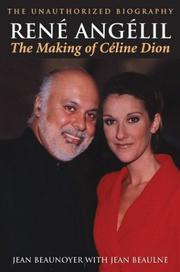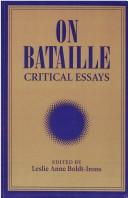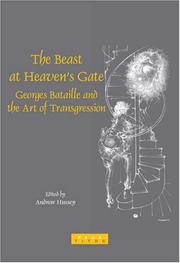| Listing 1 - 10 of 31 | << page >> |
Sort by
|

ISBN: 1282814591 9786612814594 1554880076 141759814X 1550024892 9781550024890 9781417598144 9781459714779 1459714776 9781554880072 Year: 2002 Publisher: Toronto, Ontario : The Dundurn Group,
Abstract | Keywords | Export | Availability | Bookmark
 Loading...
Loading...Choose an application
- Reference Manager
- EndNote
- RefWorks (Direct export to RefWorks)
New details of Anglils life are revealed in this unauthorized biography of the man who orchestrated the incredible success of Cline Dion.

ISBN: 9780253218827 0253218829 0253348226 9786612075544 1282075543 0253112419 9780253112415 9780253348227 9781282075542 6612075546 Year: 2007 Publisher: Bloomington : Indiana University Press,
Abstract | Keywords | Export | Availability | Bookmark
 Loading...
Loading...Choose an application
- Reference Manager
- EndNote
- RefWorks (Direct export to RefWorks)
A contemporary, critical reappraisal of Bataille's philosophy.
Bataille, Georges, --- Bataille, Georges --- Angélique, Pierre, --- Auch, --- Lord Auch, --- Bataiyu, Joruju, --- Bataiyu, G., --- בטאיי, ז׳ורז׳, --- Angélique, Pierre --- Lord Auch --- Bataiyu, Joruju --- Bataiyu, G.
Book

ISBN: 9791030005349 290344076X Year: 2020 Publisher: Pessac : Presses Universitaires de Bordeaux,
Abstract | Keywords | Export | Availability | Bookmark
 Loading...
Loading...Choose an application
- Reference Manager
- EndNote
- RefWorks (Direct export to RefWorks)
L’intitulé de ce troisième colloque universitaire recouvre la première moitié du très beau titre de la thèse de doctorat de Joseph Rouffanche consacré à Jean Follain, Espace du cœur et passion du temps, dont le premier volet fut largement exploré lors de la rencontre de Mortemart en 2003. Le présent colloque marque une première étape fondatrice dans l’existence de la jeune Société des Amis de Joseph Rouffanche (S.AJ.O.R.), qui entend étudier et promouvoir l’œuvre du poète, ainsi que, plus largement, la poésie contemporaine. Il nous a semblé opportun d’ouvrir la définition de « l’espace du cœur » que propose le poète dans son mémoire, où l’expression représente « la mémoire des jeunes années, matériau de prédilection du poétique, substance dont presque tout poème plus ou moins se nourrit, que tout rappelle, où tout ramène, pour célébrer, magnifier, inventer, et pour un salut ». La terre limousine incarne le « luxe du cœur » de Rouffanche (Élégies limousines). Il s’agit là à la fois d’un territoire fondateur, symbole d’un certain rapport au monde, réalisé dans l’enfance. Mais « l’espace du cœur » recouvre différentes acceptions que les études présentées ici explorent finement : lien du poète à l’espace aérien ; temple de l’écriture ; compagnonnage avec des auteurs de prédilection ; proximité d’un bestiaire ; cadastre du monde et cartographie de l’âme.

ISBN: 0585043582 9780585043586 0791424553 0791424561 0791497011 Year: 1995 Publisher: Albany : State University of New York Press,
Abstract | Keywords | Export | Availability | Bookmark
 Loading...
Loading...Choose an application
- Reference Manager
- EndNote
- RefWorks (Direct export to RefWorks)
Philosophy & Religion --- Philosophy --- Bataille, Georges, --- Bataille, Georges --- Angélique, Pierre --- Auch, --- Lord Auch --- Bataiyu, Joruju --- Bataiyu, G. --- בטאיי, ז׳ורז׳,
Book
ISBN: 9782757401095 2757401092 2757418769 Year: 2009 Volume: *5 Publisher: Villeneuve-d'Ascq Presses universitaires du Septentrion
Abstract | Keywords | Export | Availability | Bookmark
 Loading...
Loading...Choose an application
- Reference Manager
- EndNote
- RefWorks (Direct export to RefWorks)
Georges Bataille, la terreur et les lettres met en cause la vulgate critique qui, à la suite de Tel Quel, continue à donner la faveur à une lecture « terroriste » de l'œuvre bataillienne. On lit toujours Bataille pour le sublime de son abjection et la passion indicible de ses textes. On retient encore de son œuvre ce moment initial où la révolte contre le surréalisme contribue à proposer l'image durable d'une « écriture » antirhétorique, sacrificielle et pulsionnelle. Or, cette approche est aussi historiquement limitée qu'elle est textuellement problématique. Elle ne permet pas de prendre en compte l'ensemble d'une réflexion littéraire qui, dans les années quarante, revient sur ses textes et repense leur relation au sacrifice et à l'indicible. C'est donc à partir d'une relecture générale de l'œuvre et plus particulièrement de certains textes charnières des années quarante (le Coupable, L'expérience intérieure, L'impossible) que le présent ouvrage remet en question le « terrorisme » de Bataille. Il réévalue son approche littéraire dans le contexte critique des œuvres contemporaines pour montrer que l'appel paulhanien à un « retour à la rhétorique » trouve alors davantage d'échos dans l'écriture bataillienne que la terreur anti-poétique. L'expérience intérieure de Bataille, son « impossibilité », n'y perdent pas leur tension vers l'indicible. Elles y gagnent une conscience de leurs clichés et le savoir très sûr de leur littérarité.
Bataille, Georges, --- Criticism and interpretation. --- Bataille, Georges --- Angélique, Pierre --- Auch, --- Lord Auch --- Bataiyu, Joruju --- Bataiyu, G. --- בטאיי, ז׳ורז׳, --- Literature (General) --- littérature contemporaine --- littérature française
Book
ISBN: 0804784280 9780804784283 9780804776066 0804776067 9780804776073 0804776075 Year: 2012 Publisher: Stanford, California : Stanford University Press,
Abstract | Keywords | Export | Availability | Bookmark
 Loading...
Loading...Choose an application
- Reference Manager
- EndNote
- RefWorks (Direct export to RefWorks)
This book investigates what Bataille, in "The Pineal Eye," calls mythological representation: the mythological anthropology with which this unusual thinker wished to outflank and undo scientific (and philosophical) anthropology. Gasché probes that anthropology by situating Bataille's thought with respect to the quatrumvirate of Schelling, Hegel, Nietzsche, and Freud. He begins by showing what Bataille's understanding of the mythological owes to Schelling. Drawing on Hegel, Nietzsche, and Freud, he then explores the notion of image that constitutes the sort of representation that Bataille's innovative approach entails. Gasché concludes that Bataille's mythological anthropology takes on Hegel's phenomenology in a systematic fashion. By reading it backwards, he not only dismantles its architecture, he also ties each level to the preceding one, replacing the idealities of philosophy with the phantasmatic representations of what he dubs "low materialism." Phenomenology, Gasché argues, thus paves the way for a new "science" of phantasms.
Phenomenology. --- Philosophy, Modern --- Bataille, Georges, --- Bataille, Georges --- Angélique, Pierre --- Auch, --- Lord Auch --- Bataiyu, Joruju --- Bataiyu, G. --- בטאיי, ז׳ורז׳, --- Philosophy.

ISBN: 904202013X 9789042020139 9401203059 1429468017 9789401203050 9781429468015 Year: 2006 Volume: 282 Publisher: Amsterdam: Rodopi,
Abstract | Keywords | Export | Availability | Bookmark
 Loading...
Loading...Choose an application
- Reference Manager
- EndNote
- RefWorks (Direct export to RefWorks)
The essays in this collection were originally given at the international colloquium Cent Ans de Bataille: La Bataille de Cent Ans held at the Fondació Tàpies in Barcelona in September 1998. They are written from a variety of perspectives but are drawn together by the singular aim of addressing and interrogating Georges Bataille as our contemporary whose fascination with the rupture between mythical and experimental forms of discourse defines our own age as much as it did in Bataille’s own time. More precisely, the essays in this collection range over Bataille’s status as a novelist, a poet, an art critic, a philosopher and a prophet of post-modernity with this aim in mind. They not only seek to advance and clarify debate about Bataille’s present status in the post-modern canon but also shed new light on the complex relation between Bataille and the present generation of readers who have come to him through the prism of post-modernist thought. It is of significance for each writer in this collection, most crucially, that the premonition of catastrophe which defined Bataille’s fluid political positions is also located between tragedy and irony.
Bataille, Georges, --- Criticism and interpretation --- Bataille, Georges --- French literature --- Angélique, Pierre --- Auch, --- Lord Auch --- Bataiyu, Joruju --- Bataiyu, G. --- בטאיי, ז׳ורז׳, --- Bataille, Georges, - 1897-1962 - Criticism and interpretation --- Bataille, Georges, - 1897-1962 --- French literature.
Book
ISBN: 0801499542 9780801426605 080142660X 1501705415 9781501705410 9780801499548 Year: 2016 Publisher: Ithaca, NY : Cornell University Press,
Abstract | Keywords | Export | Availability | Bookmark
 Loading...
Loading...Choose an application
- Reference Manager
- EndNote
- RefWorks (Direct export to RefWorks)
Why did France spawn the radical poststructuralist rejection of the humanist concept of 'man' as a rational, knowing subject? In this innovative cultural history, Carolyn J. Dean sheds light on the origins of poststructuralist thought, paying particular attention to the reinterpretation of the self by Jacques Lacan, Georges Bataille, and other French thinkers. Arguing that the widely shared belief that the boundaries between self and other had disappeared during the Great War helps explain the genesis of the new concept of the self, Dean examines an array of evidence from medical texts and literary works alike. The Self and Its Pleasures offers a pathbreaking understanding of the boundaries between theory and history.
Philosophical anthropology --- History of civilization --- Bataille, Georges --- Lacan, Jacques --- Criminal psychology --- Masochism --- Self (Philosophy) --- Self --- Philosophy --- Psychic masochism --- Paraphilias --- Personality disorders --- Sadomasochism --- Suffering --- Criminal psychiatry --- Criminals --- Psychology, Criminal --- Criminal anthropology --- Psychology --- Psychology, Pathological --- Personal identity --- Consciousness --- Individuality --- Mind and body --- Personality --- Thought and thinking --- Will --- History --- Angélique, Pierre, --- Auch, --- Lord Auch, --- Bataiyu, Joruju, --- Bataiyu, G., --- בטאיי, ז׳ורז׳, --- France --- Intellectual life --- LITERARY CRITICISM / Semiotics & Theory. --- Angélique, Pierre --- Lord Auch --- Bataiyu, Joruju --- Bataiyu, G. --- Psychoanalyse --- History. --- psychoanalytische theorie. --- Bataille, Georges, --- Lacan, Jacques,
Book
ISBN: 0252080610 0252096932 9780252038976 9780252080616 9780252096938 0252038975 Year: 2015 Publisher: Urbana, [Illinois] ; Chicago, [Illinois] ; Springfield, [Illinois] : University of Illinois Press,
Abstract | Keywords | Export | Availability | Bookmark
 Loading...
Loading...Choose an application
- Reference Manager
- EndNote
- RefWorks (Direct export to RefWorks)
A myth-busting history focusing on Louis St. Ange de Bellerive, the forgotten figure who guided a great American city through its infancy.
French --- Frontier and pioneer life --- Frenchmen (French people) --- Ethnology --- Border life --- Homesteading --- Pioneer life --- Adventure and adventurers --- Manners and customs --- Pioneers --- History --- Saint-Ange de Bellerive, Louis Groston de. --- De Bellerive, Louis Groton de Saint-Ange --- Bellerive, Louis Groton de Saint-Ange de --- St. Ange, Louis --- Saint-Ange de Bellerive --- Saint Louis (Mo.) --- Illinois --- St. Louis (Mo.) --- St. Louis --- City of St. Louis (Mo.) --- Sent-Lüis (Mo.) --- Горад Сент-Луіс (Mo.) --- Horad Sent-Luis (Mo.) --- Сэнт-Луіс (Mo.) --- Сейнт Луис (Mo.) --- Seĭnt Luis (Mo.) --- San Luis (Mo.) --- San Luis de Iluenses (Mo.) --- Ciudad de San Luis (Mo.) --- Sankta Luiso (Mo.) --- סנט לואיס (Mo.) --- Sanṭ Luʼis (Mo.) --- Urbs Sancti Ludovici (Mo.) --- Sancti Ludovici (Mo.) --- Sentluisa (Mo.) --- Sent Luisas (Mo.) --- Сент Луис (Mo.) --- セントルイス (Mo.) --- Sentoruisu (Mo.) --- São Luís (Mo.) --- Сент-Луїс (Mo.) --- Sent Loisos (Mo.) --- 圣路易斯 (Mo.) --- Shengluyisi (Mo.) --- Sheng lu yi si (Mo.) --- Sheng Luyisi (Mo.) --- City of Saint Louis (Mo.) --- Lacledes Village (Mo.) --- Mound City (Mo.) --- Pain Court (Mo.) --- Pancore (Mo.) --- Saint Lewis (Mo.) --- Saint Louis City (Mo.) --- Rome of the West (Mo.) --- STL (Mo.) --- Gateway to the West (Mo.)
Multi
ISBN: 9780521111997 0521111994 9780511998270 9781107673694 9781139144858 1139144855 0511998279 9781139137522 1139137522 1283315114 9781283315111 1139141538 9781139141536 9781139141536 1107673690 1139235117 9781139235112 1107232422 9781107232426 1139140655 9781139140652 9786613315113 6613315117 113913907X Year: 2010 Publisher: Cambridge Cambridge University Press
Abstract | Keywords | Export | Availability | Bookmark
 Loading...
Loading...Choose an application
- Reference Manager
- EndNote
- RefWorks (Direct export to RefWorks)
In this vividly written biography, William E. Wallace offers a new view of the artist. Not only a supremely gifted sculptor, painter, architect and poet, Michelangelo was also an aristocrat who firmly believed in the ancient, noble origins of his family. The belief in his patrician status fueled his lifelong ambition to improve his family's financial situation and to raise the social standing of artists. Michelangelo's ambitions are evident in his writing, dress and comportment, as well as in his ability to befriend, influence and occasionally say 'no' to popes, kings and princes. Written from the words of Michelangelo and his contemporaries, this biography not only tells his own stories, but also brings to life the culture and society of Renaissance Florence and Rome. Not since Irving Stone's novel The Agony and the Ecstasy has there been such a compelling and human portrayal of this remarkable yet credible human individual.
Michelangelo Buonarroti, --- Michelangelo --- Artists --- Michelangelo Buonarroti --- Buonarroti, Michelangelo --- Mikelandzhelo Buonarroti --- Mikelʹ-Andzhelo --- Michael Angelo --- Miguel Angel --- Mīkilānjilū --- Michelangiolo --- Michel-Ange --- Michał Anioł --- Buonarroti, Michel Angelo --- Miguel Angelo --- Michelagniolo Buonarroti --- Buonarroti, Michelagniolo --- Michelangiolo Buonarroti --- Michaelangelo --- Michelagnolo di Lodovico Buonarroti Simoni --- di Lodovico Buonarroti Simoni, Michelangelo --- Микеланджело Буонарроти --- מיכאל־אנג׳לו בואונארוטי, --- Arts and Humanities --- General and Others
| Listing 1 - 10 of 31 | << page >> |
Sort by
|

 Search
Search Feedback
Feedback About UniCat
About UniCat  Help
Help News
News